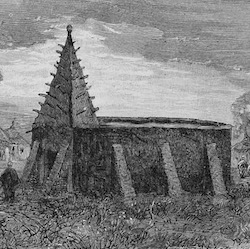Collections

Failed Islamic States in Senegambia
by David RobinsonIn the 18th and 19th centuries, several determined reformers sought to extend the breadth and depth of Islamic practice in Senegambia and neighboring areas by using the 'jihad of the sword.' In each case their military efforts failed in the medium and long term, and sometimes more quickly, and did little to extend the faith. Their failure led Senegambian Muslims to think more of Sufi forms and practices of the faith, in which the political domain was much less important than the religious, social and economic realms, and to accept various forms of accommodation with the new political authorities, in this case the administrators of French West Africa.

Discourses of Muslim Scholars in Colonial Ghana
by John Hanson and Muhammad al-Munir Gibrill13 poems of al-ḥājj 'Umar ibn Abī Bakri of Kete-Krachi, the leading Muslim scholar of his era. It includes annotated English translations of Arabic and Hausa documents written during the late nineteenth and early twentieth centuries. It reveals one Muslim's views about the era and offers assessments and advice that are relevant to Muslims in Ghana today. Al-ḥājj 'Umar's poems, written for recitation, are very sophisticated examples of classical Arabic literature.
Senegambian Branches of the Qadiriyya Sufi Order
By Maria Grosz-Ngaté
The Qadiriyya Sufi order was developed into a public institution in West Africa by Sidi al-Mukhtar al-Kunti (1729-1811), the charismatic and erudite leader of a Kunta lineage in the Timbuktu region. His descendants and disciples such as Buh Naama Kunta were instrumental in bringing the Qadiri form of Islam to the regions south of the Sahara in the course of their travels, following a pattern of peaceful dissemination through trade. Buh Naama’s son Buh Muhammed (1840-1914) established a new branch of the Qadiriyya in Ndiassane, Senegal, that attracted many followers of Mande background among others.
Maria Grosz-Ngate's digital gallery explores the Buh Kunta religious community as a transnational movement. Interviews, still photographs, video, and other primary sources document the religious and social life of this community, the ways in which contemporary Malian followers maintain their identification with Ndiassane across national borders, and the links with spiritual leaders in Mauritania.
Commercial and Gender Morality Among Lay Traders in Kumasi
by Gracia Clark
Investigations of ethical issues in Islam often privilege learned scholars whose opinions have public legitimacy and written expression. But the understandings that inform the daily choices of lay people also constitute an influential dimension of Muslim life. Gracia Clark explores the enactment of Islamic virtues in the work and family lives of traders and craft workers in her gallery.
Through interviews with men and women from a range of local commercial contexts and through participant observation of workplaces and homes, Clark examines the development of moral practices and gleans insights and examples of how Muslims adapt ethical and theological principles into daily routines. Complemented by documents from the King of Asante’s Archives, this diverse collection sheds light on the adaptation and negotiation of Muslim principles in commerce and gender relations in pluralistic Kumasi.



